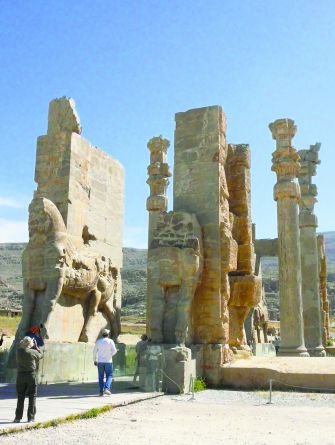Here is part of an article about us that came out this week in the Forward. It’s all true.
Ask the State Department whether it is any safer now for Americans to travel to Iran, and the answer you’ll get will be unequivocally negative. The nuclear deal reached with Tehran, as a State Department travel warning makes clear, “does not alter the United States’ assessment of the risks of travel to Iran for U.S. citizens.”
But then ask Steve Kutay, a tour organizer to Iran based in Ashville, North Carolina.
“I tell them it’s one of the safest countries I’ve ever visited,” said Kutay, 75, a Jewish transplant from Brooklyn now settled deep in the South.
It’s not like Kutay hasn’t gotten this question before. “This is the first question people ask me,” he noted.
But for Kutay, and for others in the business, the events of the past few months represent an opportunity to turn Iran, currently a niche destination that few Americans visit, into a prime vacation site for lovers of history, archaeology and nature.
The recently signed nuclear deal, they hope, will help lift the veil of fear and mystery surrounding Iran, and allay some of the suspicions many Americans harbor toward the country and its treatment of U.S. nationals. If Americans’ mindset toward Iran does indeed shift, this select group of travel agents and tour providers stand ready to capitalize on the opening. Indeed, some are already launching new tours. Their promotional pitches promise to help tourists discover the “wonders of Persia.” There are even plans for a Jewish heritage tour in the works.
The New York Times began organizing 13-day trips to the “once-forbidden land of Iran,” earlier this year. Their tours are led by former New York Times reporter Elaine Sciolino, who has experience reporting from Iran. The tours, the Times reports, are “selling fast.”
While there are several travel agencies, mainly in the Los Angeles area, that advertise trips to Iran and boast added tours this coming year, none were willing to discuss their plans with the Forward, presumably due to the uncertainty that still surrounds the future of American-Iranian relations.

Still Standing: Persepolis, in Southern Iran, built by Darius the Great in the Sixth Century B.C.E. was the ceremonial capital of the Achaemenid Empire.
But business isn’t the sole motivation for some of those involved in getting Americans to visit Iran; there’s also a sense of mission. Some want to use their position as middlemen to help dispel preconceived notions Americans may have about the Islamic Republic.
“I feel in a way that it’s a mitzvah to bring people there,” Kutay said. “I’ve been to about 80 countries, and I haven’t seen any country that Americans have more misconceptions about than Iran.”
At a stage in life when many of his contemporaries are enjoying their retirement, Kutay has turned his passion to bring tourists to Iran into a second career as a tour organizer to the country that many Jews see as a visceral enemy of both America and Israel.
The septuagenarian is not unaware of the irony, given Iran’s hostility to Israel. Kutay’s father was a Jewish immigrant from Lithuania, and his mother was born in Brooklyn. The family went to synagogue on holidays only, but the neighborhood was so Jewish that observance was never a measure for Jewish identity.
Later in life, though his New York accent never left him, Kutay traveled the country, moving west to Santa Fe, New Mexico, before settling down in North Carolina. His first business, as an importer of handicrafts from Indonesia and New Guinea, sparked a taste for world cultures. Eventually, while serving on the Santa Fe Council on International Relations, he began organizing educational trips across the world, including one to Iran.
A year ago he reached out to the Iranian travel agents he had worked with on that trip and started his new business, Iran Luxury Travel, focused solely on taking American tourists to Iran.
“They love Americans,” Kutay said of his encounters with Iranians. “When Iranians hear that you’re an American, they go berserk; they want to take pictures with you, talk to you, invite you to a picnic. They’re wonderful people.” The more Americans that go to Iran, he believes, the easier it will become to change the way Americans perceive the country.
Kutay rejected concerns that one consequence of his enterprise could be more cash for a regime that has declared its wish to see the demise of Israel, home to the world’s largest Jewish population.
“The money that Americans spend there is not a great amount and most of it goes to the private entrepreneurs,” he said, noting that only a small portion goes to the Iranian government as taxes and fees. “It’s a big leap of faith to say that the government will use this money to attack Israel.”
Kutay believes that most Iranians do not hate Israel and are not actively seeking its destruction, and that the more Americans go to Iran, the better understanding Iranians will have of the west and of Israel.
